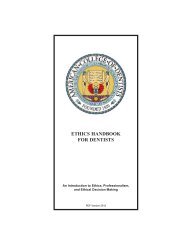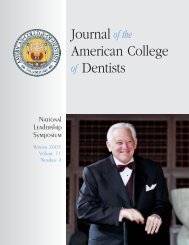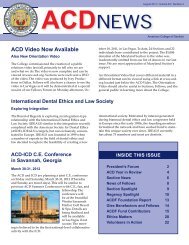Journal of the American College of Dentists
Journal of the American College of Dentists
Journal of the American College of Dentists
You also want an ePaper? Increase the reach of your titles
YUMPU automatically turns print PDFs into web optimized ePapers that Google loves.
Editorial<br />
From <strong>the</strong> Editor<br />
Lessons in Shifting <strong>the</strong> Burden:<br />
#2. Competence to Practice<br />
The one-shot format is<br />
constitutionally flawed<br />
as a means <strong>of</strong> supporting<br />
a conclusion about <strong>the</strong><br />
skill level <strong>of</strong> candidates.<br />
Dr. R. P. Thomas made <strong>the</strong>se<br />
remarks at <strong>the</strong> meeting <strong>of</strong> <strong>the</strong><br />
National Association <strong>of</strong> Dental<br />
Examiners: “Dental education has reached<br />
a state <strong>of</strong> perfection where <strong>the</strong> schools<br />
can be entrusted with determining who<br />
shall be eligible for public service.”<br />
Certainly, at one point in <strong>the</strong> evolution<br />
<strong>of</strong> <strong>the</strong> pr<strong>of</strong>ession, that was a goal shared<br />
by <strong>the</strong> educational and licensure communities<br />
and by <strong>the</strong> pr<strong>of</strong>ession and <strong>the</strong><br />
public. But perhaps Dr. Thomas was a<br />
few years ahead <strong>of</strong> his time. The meeting<br />
where he spoke took place in 1938.<br />
Licensure boards predated dental<br />
schools as indispensable protectors <strong>of</strong><br />
<strong>the</strong> public from unqualified individuals<br />
who are self-declared as meeting pr<strong>of</strong>essional<br />
standards. During <strong>the</strong> formative<br />
years <strong>of</strong> dental education in <strong>the</strong> first<br />
half <strong>of</strong> <strong>the</strong> twentieth century, examiners<br />
and schools were partners in <strong>the</strong> task<br />
<strong>of</strong> defining what dentistry should be.<br />
The early issues <strong>of</strong> <strong>the</strong> <strong>Journal</strong> <strong>of</strong><br />
Dental Education are largely given<br />
over to collaborations on this project.<br />
But we did not finish our work and <strong>the</strong><br />
partnership fizzled.<br />
Currently, licensure boards work with<br />
state legal structures for <strong>the</strong> regulation<br />
<strong>of</strong> commerce and with testing services<br />
to secure <strong>the</strong> funds <strong>the</strong>y need. We hear<br />
little today <strong>of</strong> <strong>the</strong> original goal <strong>of</strong> defining<br />
<strong>the</strong> standards <strong>of</strong> what it means to<br />
practice dentistry at <strong>the</strong> highest level <strong>of</strong><br />
pr<strong>of</strong>essional competency.<br />
Recently I have noticed a pattern in<br />
discussions in <strong>the</strong> national committees<br />
I participate in. Bad-mouthing “some<br />
elements in <strong>the</strong> pr<strong>of</strong>ession” is becoming<br />
a new art form. It must make some<br />
feel good to do that because I am certain<br />
it does little or nothing for <strong>the</strong> general<br />
level <strong>of</strong> patient health. Among <strong>the</strong><br />
complaints I hear are lack <strong>of</strong> scientific<br />
basis for treatment options; poor judgment<br />
or overly narrow and routine<br />
treatment; greed leading to practices<br />
that are overly commercial or <strong>of</strong> questionable<br />
legality; and personal problems,<br />
such as substance abuse, inappropriate<br />
relationships with staff or patients, and<br />
practicing beyond one’s skill level. I do<br />
not recall hearing much about less-thanperfect<br />
root planing and amalgam or<br />
composite restorations.<br />
There may be some wisdom in a<br />
one-shot, live-patient test <strong>of</strong> mechanical<br />
skill under artificially circumstances.<br />
This is <strong>the</strong> “independent assessment <strong>of</strong> a<br />
minimal standard” argument: if we are<br />
uncertain about what students routinely<br />
do two years before graduation, how<br />
could <strong>the</strong>y be expected to be competent<br />
overall? There are ethical issues with <strong>the</strong><br />
boards placing candidates in positions<br />
<strong>of</strong> moral hazard and <strong>the</strong>ir unwillingness<br />
to accept responsibility for <strong>the</strong> patients<br />
<strong>of</strong> candidates <strong>the</strong> boards fail. O<strong>the</strong>rwise<br />
it makes good sense—provided that two<br />
conditions are met: <strong>the</strong> testing must be<br />
done right and it must not be a substitute<br />
for doing something more in need<br />
2<br />
2011 Volume 78, Number 4





